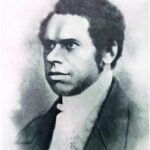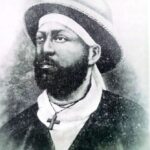WENYA TOGBI
- 2 Min Read
Togbi (Amega) Wenya, who lived during the 17th century, led the great Ewe migration from Notsie (Nouatja) in what is now Togo into what is now the extreme southeast of Ghana, in the Volta Region on the east bank of the Volta River. Here he founded the state of Anlo, and its capital, Anloga. He was also the progenitor of the Lafea clan of Anlo.
Little is known of Wenya’s early history, apart from the fact that he became the head of the Dogbo community, which comprised the future peoples of Anlo, Be, Agu, and others. At this time, all the various communities which later came to be known as Ewe lived at Notsie. When, later, the communities decided to migrate in order to escape the tyranny of the Notsie ruler, Agokoli, they broke into three divisions. Wenya, assisted by his nephew, the future Fia Sri I, led the southern division, which included the Dogbo. This division comprised splinter groups which founded virtually all the towns and settlements in the southern third of present-day Eweland, which stretches from southeastern Ghana across into the Republic of Togo.
Wenya’s own party arrived on the Ewe coast at Atiteti, at the Volta’s mouth, and then traveled east by canoe to the site of Keta, where they founded that town.
Returning westwards again, Wenya founded the towns of Tegbi and Woe. But by now Wenya had grown weak and feeble and had to be carried in a hammock. At one point he decided he would go no further because his bones had become “shrunken” (“menlo”). This was the origin of the name Anlo, which was given to the settlement that he founded there. The name later came to be applied to all the 36 settlements around the Keta Lagoon and on the islands within it that were founded by Wenya and his sons and nephews.
D. E. K AMENUMEY





